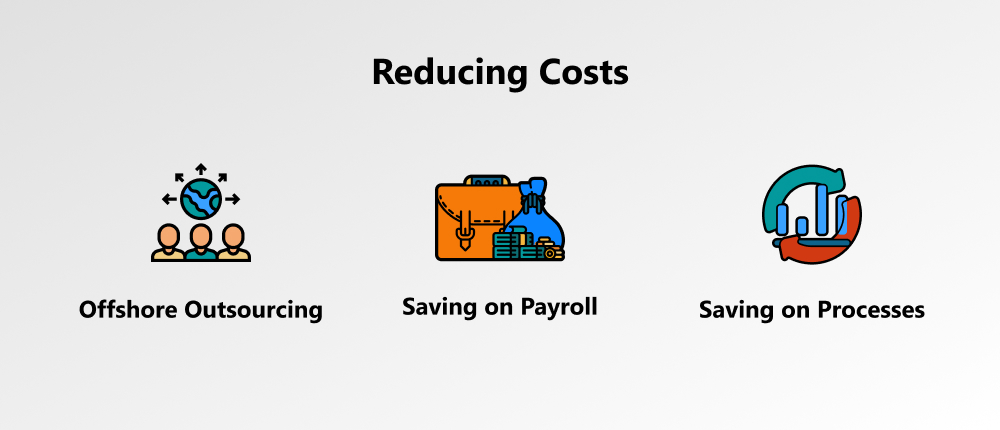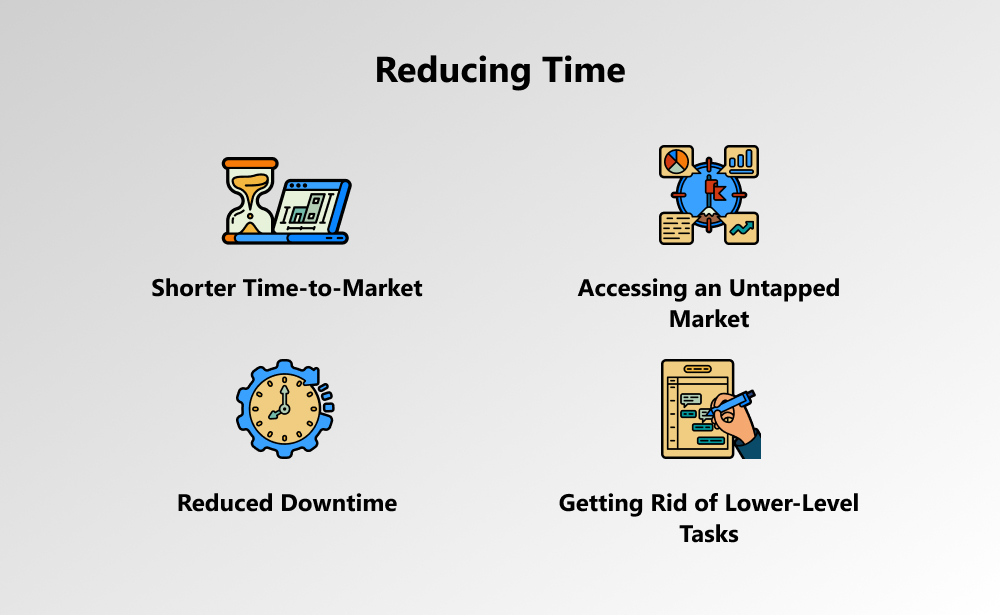As the global competition keeps increasing, businesses of all sizes turn to outsourcing as one of their main strategies. It turns out that over one-third of all small businesses outsource at least one of their processes, while giants like Microsoft and Google (among others) have as many contractors as direct employees — from marketing to human resources to software development. Which raises the question, why do companies choose to outsource work?
written by:
Aliaksandra Tsikhanovich
As the global competition keeps increasing, businesses of all sizes turn to outsourcing as one of their main strategies. It turns out that over one-third of all small businesses outsource at least one of their processes, while giants like Microsoft and Google (among others) have as many contractors as direct employees — from marketing to human resources to software development. Which raises the question, why do companies choose to outsource work?
Revenue from business process outsourcing (BPO) is projected to reach over USD 271 billion in 2020 and expected to keep growing further in the next five years, as reported by Statista. Whether it is already established businesses trying to do more with less or startups aiming to overreach their expertise, outsourcing seems to work for both.
While many still associate outsourcing with cost-cutting through offshoring, it actually can get businesses a number of compelling benefits in just about any sector, from saved resources and access to world top talents to innovation. In fact, many companies outsource these days in the way of a necessity rather than a choice.
Outsourcing in the Tech Industry
While the global pandemic has negatively affected most industries, IT development trends continued to accelerate. Businesses are more than ever pushed towards digital transformation whilst trying to keep up with ever-evolving technologies. It led to nearly 75% of companies choosing to outsource their software development and other IT-related services, making IT one of the primary outsourcing industries.
First and Foremost, Reducing Costs
Even though we mentioned earlier that cost reduction is not the only driver behind these decisions, according to Deloitte, it is still considered to be of the primary importance for most companies, especially due to the losses caused by the global pandemic. Companies ensure they accomplish the same project goals, whilst saving money. Here are the main reasons.
- Offshore outsourcing. Significant resources can be saved due to the ability to outsource software development to companies located in any part of the world. This way it is possible to ensure an appropriate or better price-quality ratio than that of hiring local expensive specialists.
- Saving on the payroll. One of the biggest advantages of having outsourced employees is paying only for the hours worked, which are usually strictly limited to the actual amount the company needs. Meanwhile, no money gets spent on taxes, bonuses, or office space needed for in-house full-time staff.
- Saving on processes. It is not only about cutting costs thanks to the new hires, but also about saving money on the hiring process and reducing other costs related to employee turnover. Meanwhile, it also helps to reduce management costs, as most service-providers cover the management of remote teams.
Not Wasting Time
Time is one of any business’s most valuable assets, and wasting it can cost its success, especially for one that is newly established. There are several ways in which outsourcing can help to avoid this.
- Shorter time-to-market. The beauty of outsourced companies is that they specialize in a specific field and their workers have a variety of experience and established communication skills in similar projects. It means they can deliver the project efficiently and quickly, while not trading off the quality of the work done, with the entire process being not so time-consuming. Meanwhile, if the outsourced company also has staff in different time zones, it might possibly mean having their assistance around the clock or having work done by morning, if the communication.
- Accessing an untapped market. An outsourcing model is especially beneficial for young companies and startups who need to enter the market quickly in order to have a competitive advantage, instead of learning every process on their own.
- Reduced downtime. Most IT providers can offer around the clock support, which means they can fix technical issues of any complexity at any time.
- Getting rid of lower-level tasks. Organizations often have to spend too much energy and time on minor tasks, instead of focusing on what is really important. In turn, their business evolves slower than it could have, reducing possible profits and restraining growth.
Accessing the Best Talents Worldwide
Offshore outsourcing lets you have access to the best talent you can possibly afford on a global landscape and in a timely manner. This is especially important for IT-related projects, as there is always a lack of skilled IT workers, due to how fast-paced and complex the industry gets. While avoiding special training, companies also get the advantage of someone fully experienced in the necessary domain which means avoiding trial and error processes as well as beginner mistakes that are unavoidable when, for example, conquering emerging programming languages. Furthermore, when bonuses and meeting a candidate's long-term aspirations are not a priority, the hiring process gets quicker.
“Doing What You Do Best and Outsourcing the Rest”
Companies' core business activities often get affected when the focus is diffused between non-core, even though still important, ones. Moreover, the split of focus can negatively impact the performance and efficiency of these activities.
Outsourcing work to a third party helps to free up the necessary time to focus on core business tasks while making sure no resources are wasted and the desired results are delivered in a timely manner.
This means saved assets and key employees can be directed to more strategic business areas in order to drive growth, whilst the outsourced experienced developers who live and breathe the service they are providing can deliver a more efficient high-quality solution leading to a better user experience. At the end of the day, quality is the fundamental factor for evaluating any business.
Other additional benefits of outsourcing can be seen for the management who will be not as much overloaded and can focus on driving the business forward, keeping an eye on key opportunities, and maintaining the company vision. It is especially important for companies with restricted assets, where everything counts and even small losses damage the business.
Gaining Knowledge and Capabilities
Technology is rapidly changing, and it is impossible to always keep up with all the advances and satisfy all the market needs. Therefore, sometimes it is necessary to outsource software development even if there is an in-house team of dedicated professionals, as project requirements are out of scope and there is a lack of internal teams.
In turn, the company gets provided not only with the ready project but with all the know-how and best practices transferred to their in-house team preparing them for future projects. Furthermore, practice-based learning is more efficient and allows to avoid many beginner failures that would have been inevitable without the help of experienced specialists.
Mitigating Risks
Sharing any associated risks with the chosen service provider can help to ease the burden on a company's shoulders. Good IT service providers keep up with the latest trends, successful practices, and software, given it is their area of expertise. This helps to decrease risks of failed projects due to the lack of expertise or know-how, while also helping to save money that could be otherwise spent on the latest top technology.
Gaining a Competitive Edge
Strategic outsourcing to professional talents one can afford with a singular focus on the exact practice the company is looking for gives them access to the assets that they wouldn’t otherwise have access to. This, in turn, allows smaller businesses to innovate and to rival their larger competitors or even expand to a totally new market, while more established organizations gain an advantage of digital disruption they would not have had the expertise for on their own.
Furthermore, external teams can often offer some unexpected insight and feedback that could help to improve or refresh inefficient processes and as a result optimize their costs, leading us back to the first point of cost reduction.
Flexibility and Consistent Support
After the project has been concluded, some outsourcing companies provide further maintenance and support services to their clients. This way, if the business has never had a dedicated team and the project was fully outsourced, they will still not need to hire experts in the field.
Moreover, as business needs keep changing, outsourced teams can be scaled up and down, as well as fully replaced, a process that is much more complicated — and expensive — when it comes to internal employees.
The Bottom Line and What to Expect in 2021
If you choose to outsource work, it may increase your company's productivity while intelligently managing in-house staff, providing massive savings and powerful results. It has become a new normal to outsource, and, as mentioned earlier, the demand for the services continues to grow.
As 2020 has been full of surprises and brought significant changes in how companies operate, it is expected that next year’s software outsourcing trends will be affected by these changes. Here are few things to look out for in the year 2021:
- Remote aspect of this year. Due to the lockdowns caused by COVID-19 and the mandatory “work from home” policies, businesses had to become comfortable with the concept of remote work. In fact, according to Global Workplace Analytics, 25-30% of the global workforce will continue working from home multiple days a week in 2021. The concept of outsourcing is now a less intimidating prospect, as remote working will continue to be a feature of everyday life for most companies, and the value that outsourcing can bring elsewhere will start to be more considerable than staying in-house.
- Necessity for digital transformation. Companies of all sorts are forced to digitize their processes, build successful software solutions and increase their online presence in order to solve their problems as well as satisfy increasing customer expectations — but it remains a complex proposal to enact. It would be impossible to achieve all those things quickly enough without the help of specialized, outsourcing partners.
- Cloud is a new must-have. According to Gartner, companies will invest around USD 1 trillion into cloud infrastructure development by the end of this year. Businesses are turning to cloud services not only to access innovative technology but mainly for cost reduction purposes.
- Growing need for the increased cybersecurity. While demand for cloud solutions will keep growing next year, increased attention will be paid to data security and privacy. Growing digital dependency and working from home have resulted in a 600% increase in malicious emails and increased frequency of cyberattacks, according to the UN. It means decreased reliance on in-house teams alone and an increasing need for third-party security solutions.
- Integration of Artificial Intelligence. As Artificial Intelligence becomes more tangible and familiar, the demand for AI-powered solutions integrated into software development will grow as well calling for specialized professionals and, in turn, increasing outsourcing trends.
If your company is thinking about outsourcing tasks to a reliable bunch of people, the pros and cons of this approach, we may be the right partner to share our expertise with you and help hire the right talent. Contact our Support Team or visit the website to find the talent you may need.

Contacts
Feel free to get in touch with us! Use this contact form for an ASAP response.
Call us at +44 151 528 8015
E-mail us at request@qulix.com












